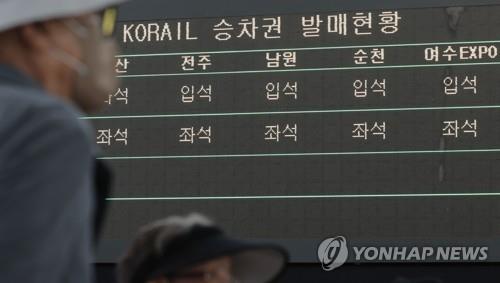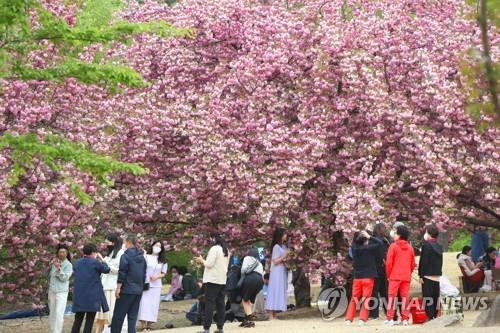- California Assembly OKs highest minimum wage in nation
- S. Korea unveils first graphic cigarette warnings
- US joins with South Korea, Japan in bid to deter North Korea
- LPGA golfer Chun In-gee finally back in action
- S. Korea won’t be top seed in final World Cup qualification round
- US men’s soccer misses 2nd straight Olympics
- US back on track in qualifying with 4-0 win over Guatemala
- High-intensity workout injuries spawn cottage industry
- CDC expands range of Zika mosquitoes into parts of Northeast
- Who knew? ‘The Walking Dead’ is helping families connect
New virus cases below 100,000 for 2nd day amid slowdown of omicron spread
South Korea reported fewer than 100,000 coronavirus cases for the second day in a row Friday as the omicron variant apparently is receding.
The country added 81,058 new COVID-19 infections, including 15 cases from overseas, bringing the total caseload to 16,755,055, the Korea Disease Control and Prevention Agency (KDCA) said.
The new tally is down more than 44,000 cases, or around 36 percent, from a week ago and marks the lowest number for Friday since Feb. 18, as the highly contagious omicron variant is in retreat.
The omicron-driven infections have been falling after peaking at 621,178 cases on March 17.
The death toll from COVID-19 came to 21,873, up 206 from the previous day. The fatality rate was 0.13 percent. The number of critically ill patients came to 833, down 13 from a day ago.
Of the locally transmitted infections, Seoul reported 13,191 cases and its surrounding Gyeonggi Province added 20,431 cases. Incheon, 40 kilometers west of Seoul, identified 4,098 cases.
As of 6 p.m. Friday, the country had reported 60,482 new cases, down 5,474 from the same time the previous day.
Daily cases are counted until midnight and announced the following morning.


An electric board displays available tickets at Seoul Station on April 21, 2022. Korea Railroad Corp. (KORAIL) began selling group tour tickets the previous day in line with the government’s eased social distancing rules. (Yonhap)
As of midnight Thursday, 44.53 million, or 86.8 percent of the 52 million population, had been fully vaccinated, and 33 million, or 64.4 percent, had received their first COVID-19 booster shots, the KDCA said.
The government urged the elderly to get second booster shots to prevent serious disease and deaths, which it began administering Monday.
It also moved to further ease social distancing rules, permitting eating and drinking in public transit, theaters, religious houses and indoor stadiums, starting Monday.
“Although we are considerably reducing regulations, responsibilities for stemming virus-related risk fall on the shoulders of individuals and any group that hosts (large indoor) events,” Prime Minister Kim Boo-kyum said during a daily virus response briefing.
“When eating indoors, people are advised to strictly adhere to precautionary measures, like avoiding talking and keeping sufficient ventilation,” he said.
Also on Monday, COVID-19 will be downgraded to the second-highest level of its four-tier infectious disease control system, the government said.
Under the changed policy, coronavirus patients will be free of mandatory self-quarantine and receive treatments at local clinics as early as late May.
The government also will temporarily lift visitation restrictions at nursing homes and senior care hospitals next Saturday for about three weeks.
In-person visits without any barriers are strictly prohibited at the moment to protect the elderly from the virus.
Those who have recently recovered from the coronavirus can visit their family members at such facilities and have physical contact with them, as long as they are fully vaccinated.
If a visitor has not been infected, he or she should receive a booster shot, and their elderly family member should receive a second booster shot.
The temporary policy runs until May 22.











